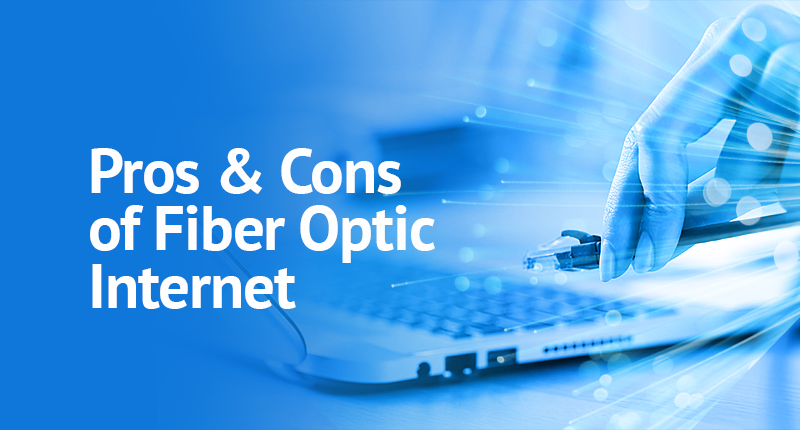Fiber internet is a leading connectivity solution in this modern world. It has become essential for advancing through the digital age. This internet type is continuing to spread across the country at an incredible pace, and we see an increasing number of options in the market.
Unlike traditional wired broadband services, fiber internet uses optical fiber cables to transmit signals. With high speeds, low latency, and more reliability, fiber internet may seem like an ideal option. But the relative newness of this technology creates many misconceptions. Therefore, it is crucial to weigh all the pros and cons of fiber internet to evaluate this connection.
Fiber Optic Internet Service
There are many ways to access the internet, and fiber is one of them. Relatively new in the market, fiber internet differs from traditional wired internet types in data transmission. Fiber internet transmits data in the form of light through optical fibers, unlike DSL and cable internet types which rely on metallic wires and electrical signals.
So, is fiber internet the most suitable option for you? You can make that decision by carefully evaluating the pros and cons of fiber optic internet. Every internet type has its benefits and drawbacks, and fiber internet is also not without them. Let’s discuss all the advantages and weaknesses of this service in detail.
Pros
- High internet speed
- Low latency
- Scalable
- Reliable
- No data loss
High Internet Speed
The most prominent advantage of fiber internet is its high speed. This internet type uses fiber optic cables with thin glass or plastic fibers to transmit data as light pulses. This data transmission makes fiber internet exponentially faster than DSL or cable internet and has symmetrical download and upload speeds.

Limited Time Discount on AT&T Fiber Ending Soon!
Plans Start at $25/mo for Eligible Applicants
Hence, with fiber internet, you can use all the connected devices or perform any internet activity without experiencing buffering or interruptions.
Low Latency
Latency is the delay in transmitting a data packet from one place to another. Among all the internet connections, fiber internet has the lowest latency rate. Therefore, fiber internet is the top choice of gamers. Additionally, the low latency of fiber internet allows you to perform the following tasks efficiently:
- Downloading and uploading large files without lags
- Attend virtual meetings with better video quality
- Make crystal clear VoIP calls
- Improve collaboration between your team
Scalable
Another prominent advantage of fiber internet is that it is scalable. Fiber optic cables are much simpler to work with than copper wires as they are lighter and smaller. Additionally, installing new equipment over the already laid fiber network is effortless. Plus, fiber internet is an excellent investment for the future as it has the potential to handle the increased bandwidth demand.
Secure
Our growing dependency on the internet has made us more vulnerable to cyber threats. Security has become a significant issue for many businesses, which is why fiber internet is like a sigh of relief for them. It is more secure than other traditional broadband services since it transmits data as light pulses. This data transmission makes it difficult for intruders to breach your data packets since there is no leakage.
Additionally, it is effortless to identify data breaches as they immediately result in system failure. Furthermore, a fiber network is manageable and easier to maintain and regulate since its hardware is at one location. While fiber internet might not mitigate all your security risks, it will still guarantee a more secure connection.
Reliable
Since fiber internet transmits data as light pulses instead of electrical pulses, it does not lose any data due to electromagnetic interference (EMI). This type of data transmission makes it incredibly reliable than cable or DSL internet services, which are prone to attenuation. Therefore, fiber internet is a popular internet connection among businesses as they often deal with confidential data.
Furthermore, fiber optic cables are not affected by different weather, temperature, and water. Hence, you don’t have to worry about spotty signals or outages.
Cons
- Limited availability
- Susceptible to physical damage
- Expensive
- Prone to fiber fuse
- Unidirectional data transmission
Fiber internet may seem like a perfect solution for all your broadband problems but it does not mean it is free from all weaknesses. It has its fair share of drawbacks which you carefully need to consider.
Limited Availability
The biggest drawback of fiber internet is its limited availability. Since it requires new infrastructure, it is not available at every location. As of now, you can mostly find it in large urban areas. However, the coverage is patchy even in those areas, and you can only access it at specific locations. The lack of infrastructure and the expensive costs of placing new fiber lines make it inaccessible in rural and remote places.
The good news is that the telecommunication industry is making efforts to resolve the availability issue. And many providers are cooperating with the government to expand fiber coverage to more areas and states.
Susceptible to Physical Damage
Fiber optic cables are inclined to damage easily, as they are more fragile than copper wires. Therefore, they require careful handling. Since they are smaller and lighter, they can easily get damaged during building renovations or rewiring. Plus, they bend easily, which makes it tricky to lay them around corners. Also, any exposure to chemicals or radiation can impair the fiber network.
Expensive
While fiber internet is an excellent connectivity option, in the long run, its upfront costs are exceptionally high. This internet type requires special equipment along with professional installation, as many providers don’t offer the elf installation option. The installation process, equipment, and activation charges often make fiber internet unaffordable for many businesses and people. In addition, your network also requires maintenance, which can also put a strain on your wallet.
Prone to Fiber Fuse
Another drawback of fiber cables is that they are prone to fiber fuse. This fiber fuse is a condition that occurs when an imperfection in fiber cables is subjected to too much light. This fuse damages a significant number of fiber cables in a short time.
Unidirectional Data Transmission
Another drawback of most fiber optic cables is that they are unidirectional. They transmit data as light pulses in a single direction. Therefore, two concurrent fiber cables are usually laid out in parallel to make data transmission bi-directional.
Best Fiber Optic Internet Providers
| Top 10 Fiber Internet Providers | |||
| Providers | Starting Price | Speed | Contact Provider |
| AT&T Fiber | $55.00/mo. | 5000 Mbps | Call 877-395-5851 Now! |
| Frontier | $49.99/mo. | 2000 Mbps | Call 877-395-5851 Now! |
| EarthLink | $54.95/mo. | 5000 Mbps | Call 877-395-5851 Now! |
| Windstream | $39.99/mo. | 1000 Mbps | Call 877-395-5851 Now! |
| Metronet | $40.00/mo. | 1000 Mbps | Call 877-395-5851 Now! |
| CenturyLink | $49.00/mo. | 1000 Mbps | Call 877-395-5851 Now! |
| Xfinity | $29.99/mo | 6000 Mbps | Call 877-395-5851 Now! |
| Google Fiber | $70.00/mo. | 2000 Mbps | Call 877-395-5851 Now! |
| Verizon Fios | $49.99/mo. | 940 Mbps | Call 877-395-5851 Now! |
| Cox | $49.99/mo. | 1000 Mbps | Call 877-395-5851 Now! |
Why is Fiber Internet Better than Other Alternatives?
Fiber internet is better than other alternatives because of the way it transmits data. Its design supports data transmission over long distances without any attenuation, making it more reliable. Furthermore, its fiber optic cables can carry more data. Thus, it provides higher bandwidth, symmetrical speeds, data, and lower latency than other internet types. In addition, it is also not susceptible to outages and interferences since it does not deal with electrical signals.
Final Word
Fiber internet is taking the telecommunication market by storm. The fiber optic industry has grown immensely over the last few years, and we can now see multiple fiber internet providers offering affordable internet plans.
Since fiber has become a golden standard of connectivity, it is crucial to understand this internet type so you can differentiate it from other traditional broadband services. We have provided various pros and cons of fiber internet to help you evaluate this connection and upgrade to a better option. After all, no one wants to keep a slow and unsuitable internet connection type.
Carefully read all the benefits and drawbacks of fiber internet, then search for the best internet providers available in your area if you deem it suitable for your home or business internet.
FAQs
Fiber optic cable can last for decades if it is installed appropriately in an environment that keeps it protected from damaging elements. However, it is impossible to find ideal conditions practically. Therefore, the typical lifespan of a fiber cable is at least 10 years.
Fiber optic cable is resilient and lasts for decades. However, various factors and environmental conditions can impact its performance with time.
Yes, fiber is more reliable than cable and has better bandwidth and symmetrical speeds.
Yes, fiber optic is faster than 5G internet, with internet speeds reaching up to 6000 Mbps.
A 100 Mbps fiber internet plan is fast enough to support small households with activities like downloading, streaming, and updating.
On average, it can take up to four to six hours to install the fiber optic internet.
Fiber internet is significantly faster than cable internet, with a maximum speed of up to 6000 Mbps. On the other hand, cable internet can provide speeds up to 1000 Mbps.
No! While 5G is an excellent wireless internet option, it is not as reliable as fiber internet. Plus, it is unlikely to achieve the same internet speed as fiber internet in the next few years.
Fiber does not use a modem. Instead, it uses an Optical Terminal Network or ONT at each endpoint. This device converts optical signals into electrical and facilitates communication.
The answer depends on how far you are from the nearest fiber network. Typically, fiber optic installation can cost between $49 to $99.
J.Soofi
Related posts
How to Install Spectrum Internet?
Check Internet Availability

